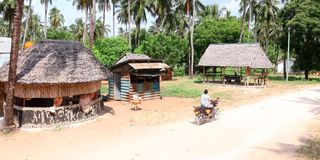Before we light up nuclear, let us get the basics right

Uyombo shopping centre in Matsangoni, Kilifi County. The area has been earmarked as a potential site for a nuclear power plant, an idea opposed by residents.
When Kilifi residents rejected the government’s plan to build a nuclear power plant in Uyombo, they did more than turn down a project site. They raised important concerns about transparency, public safety, and the need for meaningful community engagement.
The government’s quiet decision to shift the proposed site to Siaya County brings these concerns back into focus and highlights a deeper issue: whether the country is truly prepared to handle the complex demands of nuclear energy.
Nuclear power is not a risk-free or straightforward undertaking. Unlike other forms of energy generation, atomic technology involves significant health and safety risks, including the possibility of radiation leaks, long-term waste management challenges, and the need for strong disaster response systems.
Even in countries with advanced regulatory frameworks and decades of experience, nuclear energy remains a sensitive and highly monitored field. In Kenya, where basic health infrastructure is still being strengthened and emergency preparedness remains inconsistent, the implications are severe.
Supporters of nuclear energy often point to its low carbon footprint and capacity to meet growing electricity needs. These are significant advantages, particularly in the context of climate change and the demand for cleaner alternatives.
However, pursuing clean energy must never come at the expense of public health or local livelihoods. The residents of Uyombo voiced legitimate fears, ranging from displacement and environmental harm to long-term health consequences. Transferring the project to another region without addressing these fears risks repeating the same cycle of resistance and mistrust.
For Kenya to responsibly pursue nuclear energy, there must be a foundation of openness, safety, and respect for community voices. Environmental and health impact assessments should be made publicly available and subjected to independent scrutiny.
Emergency protocols must be clearly outlined, tested, and communicated. Most importantly, affected communities must be involved in the decision-making process from the beginning, not merely informed after decisions have been made.
Energy investments must place people at the centre. Projects of this magnitude demand public trust, strong institutions, and a deliberate approach that prioritises long-term safety. Kenya’s energy transition must be guided by thoughtful planning and community inclusion, not haste.
Nuclear power may one day be part of Kenya’s energy future, but it must not be rushed. Without the right systems, safeguards, and societal consensus, the risks far outweigh the rewards. Progress must be built on trust, not uncertainty.

